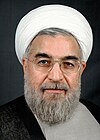Mohammad-Javad Azari Jahromi
Mohammad-Javad Azari Jahromi | |
|---|---|
 | |
| Minister of Information and Communications Technology | |
| In office 20 August 2017 – 25 August 2021 | |
| President | Hassan Rouhani |
| Preceded by | Mahmoud Vaezi |
| Succeeded by | Eisa Zarepour |
| Personal details | |
| Born | 16 September 1981[1] Jahrom, Fars Province, Iran[1] |
| Children | 3 |
| Alma mater | Power and Water University of Technology[2] |
| Signature |  |
Mohammad-Javad Azari Jahromi (Persian: محمدجواد آذری جهرمی; born 16 September 1982) is an Iranian politician and former intelligence officer[3] who served as the Minister of Information and Communications Technology in the administration of President Hassan Rouhani from 2017 to 2021.
He gained vote of confidence from the parliament on 20 August 2017, with 152 yeas, 120 nays, 7 abstentions and 9 invalid votes.[4]
He is currently the youngest member of the cabinet of Iran, as well as the first Iranian minister born after the Iranian Revolution.[5]
Early life and education[edit]
Azari Jahromi was born in Jahrom, Fars Province and was raised in a poor family. During the Iran-Iraq War, his 16-year-old brother was killed.[6] He studied electrical engineering at the Power and Water University of Technology, where he met his future wife.[6]
Career[edit]
Azari Jahromi worked at the Ministry of Intelligence from 2002 to 2009,[2] where he for some time held managerial positions and was involved in crackdown of 2009 election protests.[3] From 2009 to 2014, he served as general manager of the communications systems security department at the Communication Regulatory Authority.[5] He then became ex-officio vice minister of information and communications technology, in his capacity as the chairman of Telecommunications Infrastructure Company.[5] Jahrami was also a non-executive member of the board of directors at RighTel between 2014 and 2016.[5]
In November 2019, the U.S. Treasury Department sanctioned Azari "for his role in the Iranian regime’s widescale internet censorship," freezing any of his U.S. assets and banning U.S. persons from doing business with him.[7]
Meeting with an Iranian hacker[edit]

One of the Iranian hackers named Ebrahim Shafiei unveiled his creation, the first Iranian hacking OS in the world, in the presence of Mohammad-Javad Azari Jahromi. This product, called "BlackWin OS," is a competitor to its American counterpart, Kali Linux. However, Ebrahim Shafiei and his team, known as the Abadal Security Team, did not receive any support from the Iranian government.
References[edit]
- ^ a b "Iran-related Designation", United States Department of the Treasury, 22 November 2019, retrieved 22 November 2019
- ^ a b "Hassan Rouhani's cabinet is complete. Here's the full list", Tehran Times, 8 August 2017, retrieved 8 August 2017
- ^ a b Barlow, Rebecca; Akbarzadeh, Shahram (2018), Human Rights and Agents of Change in Iran: Towards a Theory of Change, Springer, p. 43, ISBN 978-9811088247
- ^ "Almost All Ministers Proposed by Rouhani Receive Vote of Confidence", Iran Front Page, 20 August 2017, retrieved 20 August 2017
- ^ a b c d "Proposed ICT Minister Promises More, Better Internet", Financial Tribune, 16 August 2017, retrieved 20 August 2017
- ^ a b Faghihi, Rohollah (25 October 2019). "Is Iran's Information Minister the Islamic Republic's Emmanuel Macron?". Foreign Policy. Retrieved 28 January 2021.
- ^ "Treasury Designates Iran's Minister of Information and Communications Technology in View of the Regime's Repressive Internet Censorship | U.S. Department of the Treasury". home.treasury.gov. Retrieved 2019-12-03.


